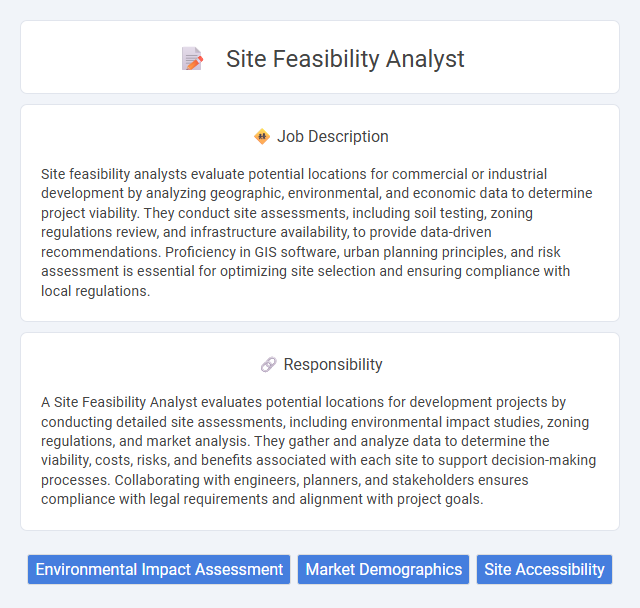
Site feasibility analysts evaluate potential locations for commercial or industrial development by analyzing geographic, environmental, and economic data to determine project viability. They conduct site assessments, including soil testing, zoning regulations review, and infrastructure availability, to provide data-driven recommendations. Proficiency in GIS software, urban planning principles, and risk assessment is essential for optimizing site selection and ensuring compliance with local regulations.
Those with strong analytical skills and an eye for detail are likely to be well-suited for a Site Feasibility Analyst role. Candidates who excel in evaluating data, assessing site conditions, and understanding regulatory requirements may find success in this position. It is probable that individuals who can work independently and communicate findings effectively will adapt best to the demands of this job.
Qualification
Site feasibility analysts require strong analytical skills and proficiency in GIS software to evaluate potential project locations accurately. A bachelor's degree in urban planning, geography, civil engineering, or environmental science is typically essential, along with experience in data analysis and site assessment techniques. Knowledge of zoning laws, environmental regulations, and land use planning enhances the ability to determine site viability effectively.
Responsibility
A Site Feasibility Analyst evaluates potential locations for development projects by conducting detailed site assessments, including environmental impact studies, zoning regulations, and market analysis. They gather and analyze data to determine the viability, costs, risks, and benefits associated with each site to support decision-making processes. Collaborating with engineers, planners, and stakeholders ensures compliance with legal requirements and alignment with project goals.
Benefit
Site feasibility analysts likely provide critical insights that improve project outcomes by evaluating potential locations for development with data-driven precision. Their analyses probably reduce financial risks and increase the likelihood of project success by identifying viable sites early in the planning process. Companies might benefit from streamlined decision-making and optimized resource allocation through their expertise in market trends, environmental factors, and regulatory requirements.
Challenge
Site feasibility analysts likely encounter the challenge of accurately predicting environmental and regulatory risks that could impact project viability. They must balance technical data with market trends to ensure site selection aligns with strategic goals while minimizing costly errors. The role probably demands continuous adaptation to evolving zoning laws and community concerns, complicating decision-making processes.
Career Advancement
Site feasibility analysts play a critical role in assessing the viability of potential project locations through market research, environmental impact studies, and cost analysis. Mastery in data analytics, regulatory compliance, and project management enhances eligibility for senior roles like Project Manager or Real Estate Development Manager. Continuous skill development in Geographic Information Systems (GIS) and financial modeling significantly boosts career progression opportunities within urban planning and construction sectors.
Key Terms
Environmental Impact Assessment
Site feasibility analysts specializing in Environmental Impact Assessment evaluate potential sites by examining soil quality, water resources, and biodiversity to determine environmental risks and compliance with regulations. They use Geographic Information Systems (GIS) and environmental modeling tools to predict the ecological effects of development projects, ensuring sustainable land use. Their assessments guide stakeholders in minimizing negative environmental consequences and optimizing site selection for construction, infrastructure, or industrial operations.
Market Demographics
Site feasibility analysts evaluate market demographics to determine the viability of new locations for business expansion. They analyze population size, age distribution, income levels, and consumer behavior patterns to predict potential customer bases. This demographic research supports strategic decisions that maximize market penetration and revenue growth.
Site Accessibility
Site feasibility analysts evaluate accessibility factors to determine the suitability of a location for development, ensuring adherence to regulatory standards and ease of access for transportation and utilities. They analyze proximity to major roads, public transit options, topography, and site entry points to optimize functionality and user convenience. Assessing accessibility reduces project risks and contributes to overall site viability and cost efficiency.
 kuljobs.com
kuljobs.com